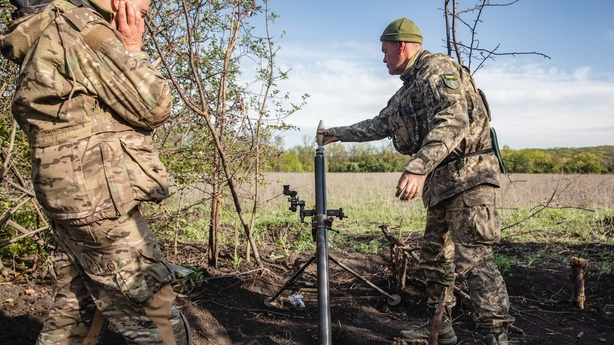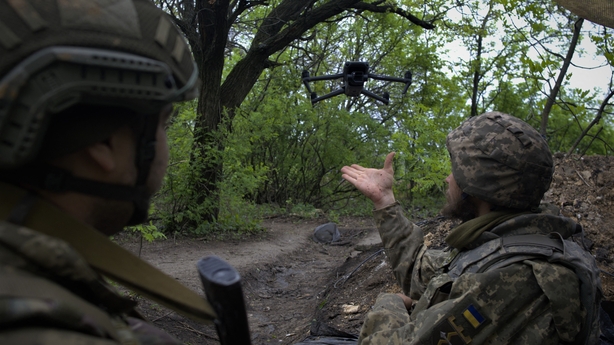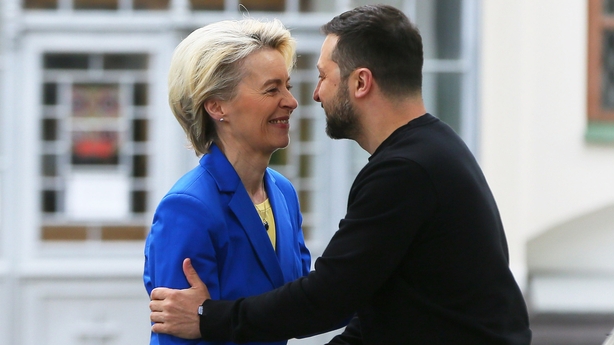A Ukrainian military unit has claimed it has routed a Russian infantry brigade from frontline territory near Bakhmut, which would confirm an account by the head of Russia's Wagner private army that the Russian forces had fled.
Later in the day, Colonel General Oleksandr Syrskyi, who heads Ukraine's ground forces, said Russian units in some parts of Bakhmut had retreated by up to 2km the result of counterattacks. He did not give details.
Wagner units have led a months-long Russian assault on the eastern city, but Ukrainian forces say the offensive is stalling.
Russia has not commented on the reports that its 72nd Separate Motor-rifle Brigade had abandoned its positions on the southwestern outskirts of Bakhmut. Reuters was unable to independently confirm the situation on the ground.
A Russian brigade is typically formed of several thousand troops.
The eastern Ukrainian city has been the primary target of Moscow's huge winter offensive and scene of the bloodiest ground combat in Europe since World War II.
Russian mercenary boss Yevgeny Prigozhin, who has repeatedly accused Moscow's regular armed forces of failing to adequately support his private army leading the fight in Bakhmut, said yesterday that the Russian brigade had abandoned its positions.
"Our army is fleeing. The 72nd Brigade pissed away three square km this morning, where I had lost around 500 men," he said.
In a statement overnight, Ukraine's Third Separate Assault Brigade said: "It's official. Prigozhin's report about the flight of Russia's 72nd Independent Motorized Rifle Brigade from near Bakhmut and the '500 corpses' of Russians left behind is true."
"The Third Assault Brigade is grateful for the publicity about our success at the front."

Earlier today, the Ukrainian unit, which was formed last year from the nationalist Azov Battalion, reposted a video of one of Azov's founders, Andriy Biletsky, who said his forces had "defeated" the Russian brigade.
"In fact, the 6th and 7th squadrons of this brigade were almost entirely destroyed, brigade intelligence was destroyed, a large number of fighting vehicles were destroyed a considerable number of prisoners were taken," he said.
"The attacks were implemented within a territory 3 km wide and 2.6 km deep, and this entire territory is completely liberated from the Russian occupying forces."
Ukraine's eastern military command said the Russian brigade had been heavily damaged, although it said Russia was still trying all-out to capture the rest of the city.

"Unfortunately they have not destroyed the whole (Russian) brigade yet, two companies have been seriously damaged there," Serhiy Cherevatyi, spokesperson for the eastern military command, said in televised comments.
"The situation (in Bakhmut) remains difficult because for the enemy, despite all the white noise Prigozhin is trying to create, it (Bakhmut) is (still) the main direction of attack, the main coveted target," he said.
Since last week, Mr Prigozhin has repeatedly threatened to pull Wagner's forces out of Bakhmut unless Russia's regular armed forces send his troops more ammunition.
In his latest remarks he said his troops were receiving only 10% of the shells they need.
Fresh Russian sanctions
European Union states are holding a first discussion on proposed new sanctions over Russia's war in Ukraine that would target Chinese and Iranian firms and allow export curbs on third countries for busting trade restrictions.
Talks among the EU envoys were set to be heated, according to one diplomat, with Russia hawks upset the plan does not go far enough but others wary of damaging their international ties.
Widely differing perspectives mean a quick deal is not expected, several diplomats said.
The EU's chief executive unveiled the plan on a symbolic trip to Kyiv yesterday - a counterbalance to annual celebrations in Moscow of the World War II victory over Nazi Germany that President Vladimir Putin likens to his invasion of Ukraine.

European Commission President Ursula von der Leyen said the new sanctions would focus on cracking down on the circumvention of Russia trade curbs already in place, and were designed "in very close coordination" with Group of Seven nations (G7).
"If we see that goods are going from the European Union to third countries and then end up in Russia, we could propose to the member states to sanction those goods' export. This tool will be a last resort and it will be used cautiously," she said.
She added the EU would stop transit via Russia of more of its exports, including advanced tech products and aircraft parts.
Diplomatic sources familiar with the proposal - drafted by Ms von der Leyen's Commission - said it also included blacklisting "tens" of new companies, including from China, Iran, Kazakhstan and Uzbekistan.
The new sanctions would highlight that oil tankers are not allowed to offload in high seas or arrive in ports with their GPS trackers off, an attempt to push back against flouting G7 restrictions on trading Russian oil, according to the sources.
Part of the push relates to growing concern, particularly in Spain, over the risk of spills as the "ghost" fleet moving Russian, Iranian and Venezuela oil grows.
"New EU measures will unfortunately do little to address the problem which is old, uninsured vessels performing STS (ship-to-ship transfers) outside the EU," Andrea Olivi, head of wet freight at commodities trader Trafigura, said. Mr Olivi pointed to a fire last week on a tanker with no known insurance in waters off Malaysia as an example.
"The EU should put pressure on the International Maritime Organization (IMO) to introduce more stringent safety and insurance measures on older vessels."
All 27 EU countries must agree for new sanctions to take effect in what would be the bloc's eleventh round of such measures since Russia invaded Ukraine in February 2022.
It would mark the first time the bloc had targeted China over accusations of Beijing's role in the war, something China's foreign ministry warned the EU against.
A diplomatic source from an EU country hawkish on Russia was frustrated the Commission's proposal did not include stopping Russian diamond imports or nuclear energy cooperation.
The person said trade lost under the proposal was estimated to be worth up to €500 million compared to what Ms von der Leyen said amounted to €11 billion in the previous round.
At the opposite end of the debate, a diplomatic source from a country critical of the sanctions said the proposal to target third countries was bound to trigger a fraught discussion.
